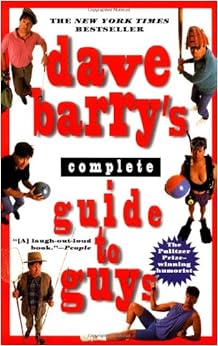Once upon a time I was a huge Dave Barry fan. This time was when I was about sixteen to about age twenty. I was introduced to him by my high school English teacher or by my high school journalism teacher (they were the same person), most likely in journalism. The teacher read an essay about grammar to us, and I was bowled over. I had to read more. And that I did, eventually.
I bought several of Barry's how-to books (Claw Your Way to the Top came first, a book on business) and his first book of columns, Bad Habits. And I laughed a lot. By age twenty, however, when I read a book of his on home improvement, the love affair was ending. His second book of columns did not seem so funny, and his book on U.S. history only moderately redeemed his more recent work for me. And now, over twenty years have passed since I last picked up one of his works.
This book I got for free from the Little Library in our neighborhood. I figured I'd give Barry a try again. It looked entertaining and funny, and it proved a great book for the light reading needed while on family vacation, since much of that vacation was spent corralling little boys at a water park and did not lend itself to deep reading on the philosophical underpinnings of why humans gather themselves into urban civilizations. Having not read reading quite so light in a long while, I now know how and why some people can manage to get through books so quickly: large print and easy to read equals short time.
The book itself, however, was something of a disappointment. Barry is a humorist. This means that his main objective is to tell jokes. There wasn't a lot to glean here other than laughs. And as I've gotten older, making me laugh has gotten relatively tougher to do. Far Side cartoons, which in my late teens were hilarious, now stir mostly a nod from me. Barry likewise might occasionally make me smile, but only one hard laugh was generated in its two hundred plus pages.
The book is about guys, as opposed to men. Here, Barry is onto something, which he does a good job of laying out in his first chapter. Guys go with the flow. They do not generally accomplish important things with their lives. They do stupid stuff. They avoid work as possible. They are not particularly moral or immoral. They are, essentially, like grown-up kids.
What follows are a number of chapters full of cliches about male behavior, some of them gleaned from personal life, some from news stories, and a number of them common ideas that have lingered in the air for generations. All's well and fine, I suppose, to make fun of males--Barry after all is one--but at some level it becomes a bit tedious and insulting. A guy's idea of housework is . . . A guy's concept of a relationship is . . . And so on. To some extent, I wonder how many of such insights are even true. My wife, indeed, is pickier about cleaning bathrooms than I am, and I have to admit that from my second apartment on as a single man, I largely avoided decorating and eschewed furniture as much as possible, though not for the reasons that Barry might pose. I did not find such stuff necessary and didn't want it weighing me down, as opposed to simply not thinking about it (I had, in fact, made an effort with my first apartment and decided I would not do so again until I owned a place and was certain to stay put). And as for relationships, I can attest to being slow to commit, but again, it was not because I never even thought about them with girls I may have gone out with, and I can say the same of many of my male friends.
About the only set of criticisms that rang true for me were those on home improvement and the feelings of inadequacy I feel as compared to “men.” I am one of those guys who wants desperately to fix up the house but who often feels overwhelmed by a set of skills I never learned or was taught and who does feel somewhat less manly because of that lack.
But of course, Barry isn't looking to tell the truth or to make great insights. He's trying to make us laugh. However, it might just be that with more life experience, I find myself less likely to laugh a stereotypes and more likely to laugh at things that do provide true insights. After all, if laughter is at least in part a reaction to surprise and discomfort, it takes some revelation of truth, perhaps previously unknown, to elicit it.
Thursday, December 31, 2015
On “Dave Barry's Complete Guide to Guys” by Dave Barry ***
Labels:
Books,
Dave Barry,
Nonfiction,
Three-Star Nonfiction
Subscribe to:
Post Comments (Atom)







No comments:
Post a Comment